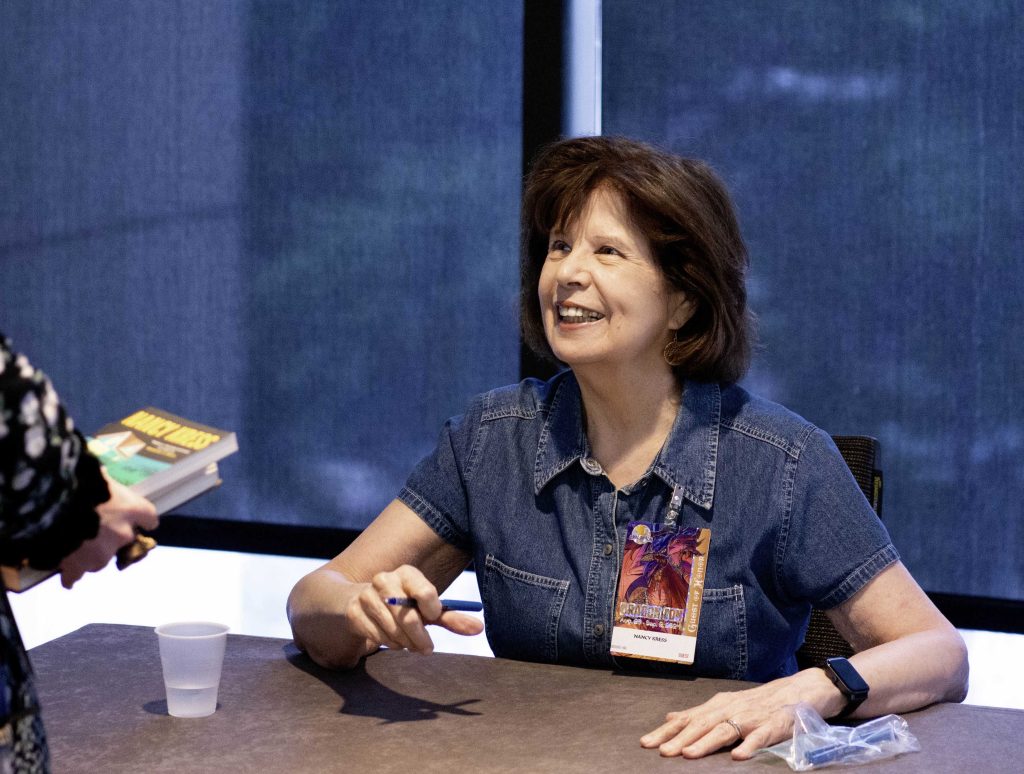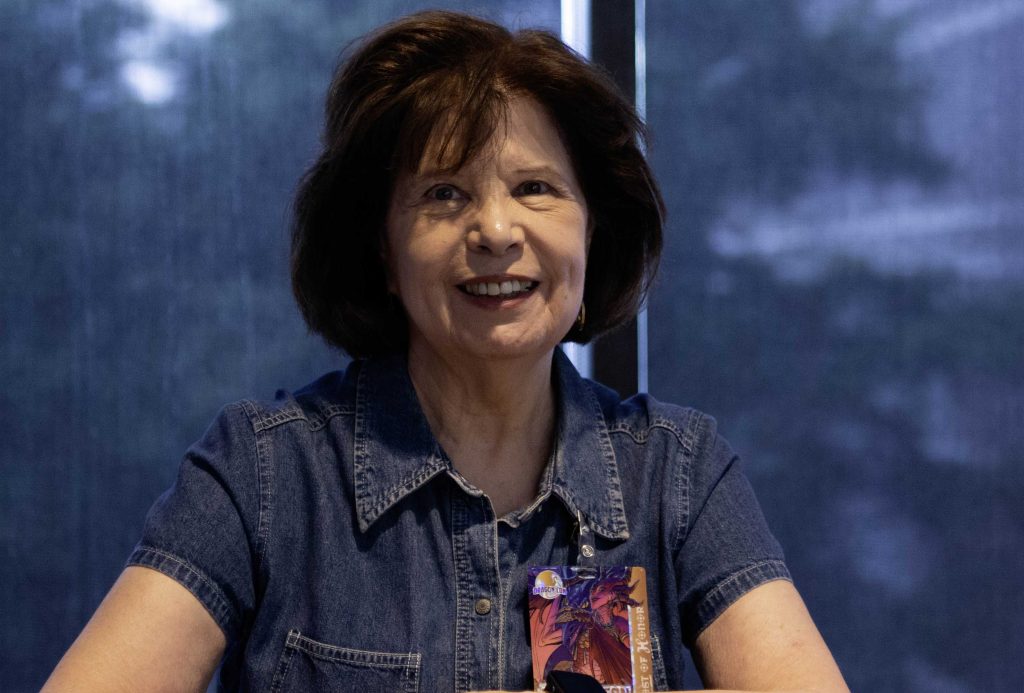
This year’s Dragon Con Literary Guest of Honor is multiple award winner Nancy Kress, author of 27 novels, over 100 short stories, and three books about writing. She’s won six Nebulas, two Hugos, the John W. Campbell Memorial Award, and the Theodore Sturgeon Award. Her novella The Beggars of Spain won both a Nebula and a Hugo in 1991-92. Kress joined moderator Darin M. Bush to discuss her career and thoughts on writing and to answer questions from attendees at the panel “Nancy Kress—Literary Guest of Honor” on Sunday at 2:30PM in Hyatt Regency VI-VII.
At the beginning of the panel, Regina Kirby came onstage to present the Dragon Con Literary Guest of Honor plaque since Kress had been unable to attend the opening ceremonies this year. Her flight was postponed due to a cyberattack at the Tacoma airport. After the presentation, Bush asked Kress if she considered herself a geek or a nerd. Kress chose nerd because she thinks a geek has “a greater familiarity with electronics” than she does. She’d prefer to write with pen and paper, but editors won’t accept handwritten manuscripts.
Kress didn’t discover science fiction until she was 14 years old. She grew up in the 50s, when the small school library had separate sections for girls and boys. She stayed in the girls’ section and read all the Andrew Lang books on fairytales. The science fiction, she said, was all in the boys’ section. The first science fiction book she read was Arthur C. Clarke’s Childhood’s End. She was hooked. Still, she had no idea that she could write and publish stories. She thought all writers were dead and no one was actively writing.
When she was young, her mother asked her if she’d like to be a nurse, a secretary, or a teacher. That was all her mother knew a woman could be. She chose teacher. Kress’s aunt couldn’t understand why she was going to college. She thought Kress was “pretty enough to get a husband.” She became a teacher, got married, and had two children. Her husband was gone a lot, and she grew bored just being a mom, so she started writing stories just for something to do. She sent them out, sold three, and started writing novels. The first three were fantasies. After that, she started writing science fiction. To her, it all seems to have “happened organically,” like she “tripped over it.”
Kress recalled learning about conventions through magazines and then attending. She remembers a moment of realization. She’d just come from a 1AM party, and standing at the elevators was a group of exhausted-looking pilots and flight attendants. When the elevator doors opened, three guys cosplaying as barbarians were pounding clubs on the elevator floor and chanting in unison. The pilots and flight attendants stepped back. Kress got on the elevator, thinking, “This is my tribe.”

As she continued writing, she tried to make the science as accurate as possible. She has taught writing for many years, and she used some of her first stories as samples for students to critique because they’re examples of what not to do. She once had a story critiqued by Bruce Sterling, who called it a “moldy literary cake” and told her that “all societies have economic underpinnings.” Kress considered the two poles of thought between Ayn Rand and Ursula Le Guin—selfishness versus communal living. Out of that came her ideas for the economic underpinnings of The Beggars of Spain. Although Le Guin’s communal sharing sounds wonderful, Kress doesn’t believe that no property would result in no crime. There would still be “crimes of passion” and people who were just “born cantankerous.”
Storytelling, Kress said, is “the way we make sense of the world.” She thinks people who read SF/F are able to see the “human truths” in an unhuman setting, something not everyone can do. With SF/F we’re able to see the problems and questions of humanity “through a different lens.” All good SF/F is “a thought experiment,” just like all tech has the potential for good and bad. For SF, she’s looking for what can go wrong.
For Kress, one of the rewards of writing is when she gets in what she called “the flow state,” like when you’re reading something so deeply it’s hard to snap out of it and resurface back into your own world. The other reward is when readers tell her they love her work. When asked about AI writing stories, she said it’s not a problem at the moment and referenced Ted Chiang’s ideas about AI. Even if you give the AI 100 prompts, it still comes out with a story that isn’t good because every word is a choice. You’d have to put in thousands of prompts, and if you’re going to do that, “you might as well write it yourself.” But in the future, who knows? Maybe that will be the basis for another enthralling SF story.
